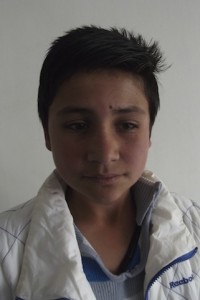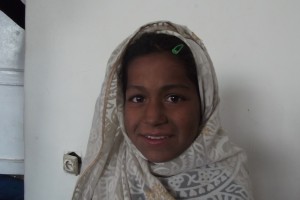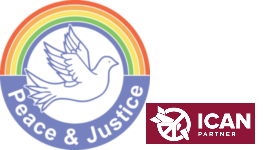This is the second installment from Maya Evans, Coordinator of Voices for Creative Nonviolence UK, who wrote to us from Kabul where she is currently leading a small delegation of women UK peace activists. Maya spoke in an Edinburgh Peace and Justice Centre Speakers Series talk after her first visit to Kabul two years ago. The delegation are staying in the Afghan Peace Volunteers house.
So we’ve just got back from seeing the street kids who came for their weekly lessons at the Borderfree Non-Violence Peace Centre. Although physically we’ve done very little today I feel quite tired. At the moment Mary is rummaging through her bag trying to find her camera so as to capture a “dramatic sunset” which is forming outside our living room window. From where I’m sat (in the corner of the room), I can only see the razor wire on our neighbour’s wall and a few yellowing clouds. Khamed Jan has just lit a fire, the room is slightly smokey. The familiar call to prayer has just started up, the quality and emotion of the Imam’s voice is almost enough to make me convert/ revert to Islam, I guess that’s the idea.
Breaking news includes the banning of Chris Cole’s Drone Wars UK website, since our drone seminar last week the Afghan Government have blocked the website which we massively plugged at our day event (which Chris spoke at via Skype)- the seminar was the first attempt to create an Afghan network of civil society groups who will record drone strikes. We had mixed success in our aim.
The street kids were all on fine form today, i managed to do a head count and there’s currently 23 on the programme, part of the APV’s economic justice and education equality thrust. I managed to interview Habib (which means love), the boy I wrote about last year. Since last year he’s been to Farah province after his uncle told him “lets go”. As usual 12 year old Habib wears a worried face, as if he carries the weight of the world on his shoulders, probably not far from that as he’s still the main bread winner of the family, a stress for any grown man let alone a pre adolescent. Habib has recently changed occupation, his weighing scales were not bringing enough money in so he’s moved onto shining shoes which earns him around 100 Afghanis per day, around £1. His weighing scales have been handed down to his 9 year old brother Samim who also works the streets. I asked him about his time in Farah province, one of the more volatile provinces in Afghanistan, known for it’s production of opium, prevalence of addicts and presence of Talibs. Habib shrugs and says “What’s there to like about Farah, there’s just fighting.” He expands a little and says there’s nothing much in Farah, no city, no health facilities, just countryside, and more importantly to Habib, nowhere to study. I ask him what he likes about Kabul, immediately he says “study”, a testimony to the success of the APV’s project as his once a week lesson at the Border Free Centre is the only schooling he receives. I ask after his mother Maryam and his 5 brothers and sisters, again he shrugs and says “fine”, they still live in the same place, a piece of tarp stretched from the side of a building which creates one living space for the 8 members of the family.

Habib talks about an average day for him, work will normally start around 9 in the morning and end around 8 at night. At the moment it’s getting dark around 5 and even teenage members of the APV tend not to be out later than 7pm as the streets are so unsafe. He says his day is tiring as there are not many places to work so he must walk around a lot which is quite tiring. His biggest worry is security and the danger of being caught up in an attack. He describes how one day there was a bomb in Polysok, a shopping area not far from the peace centre, his mother was gripped with fear so walked the streets looking for him so as to take him home. The memory of meeting his mother Maryam last year came back to me, she quietly wept under her burka as she described how her husband died in a sectarian suicide attack on a shia mosque. I ask him if he still wanted to become a doctor, he immediately says “yes”.
Next I interviewed Gul Jamma (literal translation flower friday),  she doesn’t know her age but looks around 10. She partly caught my eye because of her already apparent stunning beauty, and then her shy smile which lights up a quiet inner joy. There are only 5 girls on the project, I’m guessing there are generally less girls working the streets as usually girls and women are expected to stay in the house. Gul Jamma is Pashtoon and lives in Chara Kumba refugee camp. She looks timidly at me as I beam the biggest smile i can muster. Today she was dressed in a raggedy pink spangly dress which hangs off her thin frame. She sits crossed legged on the floor looking nervous, I suspect it’s the first time anyone has ever asked to speak with her, least of all a foreigner. Gul Jamma is painfully shy, she looks down and plays with her dress, her hands are weathered and filthy, she only occasionally looks up to flash a shy smile. I find out that her work involves trawling the streets for plastic to burn for fuel, this morning she collected 2 sacks of plastic. She’s been living in the refugee camp for the last 3 years, before then she lived in Sangin, Helmand province, the area of Afghanistan where British troops were based and the fighting has been most fierce. She says that her family left Helmand 3 years ago after her father was killed. She has 5 brothers but 2 of them have died in the war and 1 of her 5 sisters as also passed away. Her older brother was a cobbler but his equipment was stolen so now he can’t work. Her only memory of Sangin is war, I try to press her for more detail but again she just says “war”. The last year at the border free centre is her first experience of education, she says learning is important to her and when she’s older she’d like to become a teacher and help people. I want to know more about Gul Jamma but can sense a deep sadness which I feel is not my place to disturb. I ask her about toys, her only doll, she says her doll has black hair and wears a scarf but doesn’t help with housework.
she doesn’t know her age but looks around 10. She partly caught my eye because of her already apparent stunning beauty, and then her shy smile which lights up a quiet inner joy. There are only 5 girls on the project, I’m guessing there are generally less girls working the streets as usually girls and women are expected to stay in the house. Gul Jamma is Pashtoon and lives in Chara Kumba refugee camp. She looks timidly at me as I beam the biggest smile i can muster. Today she was dressed in a raggedy pink spangly dress which hangs off her thin frame. She sits crossed legged on the floor looking nervous, I suspect it’s the first time anyone has ever asked to speak with her, least of all a foreigner. Gul Jamma is painfully shy, she looks down and plays with her dress, her hands are weathered and filthy, she only occasionally looks up to flash a shy smile. I find out that her work involves trawling the streets for plastic to burn for fuel, this morning she collected 2 sacks of plastic. She’s been living in the refugee camp for the last 3 years, before then she lived in Sangin, Helmand province, the area of Afghanistan where British troops were based and the fighting has been most fierce. She says that her family left Helmand 3 years ago after her father was killed. She has 5 brothers but 2 of them have died in the war and 1 of her 5 sisters as also passed away. Her older brother was a cobbler but his equipment was stolen so now he can’t work. Her only memory of Sangin is war, I try to press her for more detail but again she just says “war”. The last year at the border free centre is her first experience of education, she says learning is important to her and when she’s older she’d like to become a teacher and help people. I want to know more about Gul Jamma but can sense a deep sadness which I feel is not my place to disturb. I ask her about toys, her only doll, she says her doll has black hair and wears a scarf but doesn’t help with housework.
Since being in Kabul we’ve heard whispered horror stories, one being that there’s currently a major trafficking ring of young Afghan women to the Middle East mainly for slavery and even body parts, the rumours say that street children are particularly vulnerable.
This morning Obama announced that the war with Afghanistan has come to a “responsible end”.
The longer I stay in Kabul the more I want to stay and open a school for street children – don’t worry Mum, I’m not going to do that, and yes, I do know that it’s not the job of do-gooding foreigners to try and save refugee children in war torn third world countries, however I’m pretty sure if any of you were here with me now you’d probably already done a indigogo for funds.
At the end of today’s lesson Mary bought out a box of Quality Street which the kids excitedly gobbled down. The wrappers were carelessly discarded on the floor by many of the children. I noticed Gul Jamma discretely bend down and collect the wrappers, no doubt to be added to her fuel stash.
The teenage members of the APV then called each of the kids out of the room to collect their monthly subsidy of food, a sack of rice and a large bottle of oil. Raul, who looks around 8 drags his sack out of the centre, he expertly bumps it down the stairs and then hikes it onto a shoulder while grabbing his bottle of oil and swiftly making off. Gul Jamma looks up at me from the bottom of the stairs and give me one of her shy smiles, my heart melts, she then skipped out of the entrance to meet a brother who has come to help her with the rice and oil. Nor Rahman, a chubby 12 year old in a filthy yellow hoddie plays with his mobile phone, he’s the kind of kid who could probably fix anything up for you, name it, he can get it. He complains to Hakim that the phone company charges him 1 Afghani every time he connects to the internet, Hakim laughs and advises him to disconnect his internet service.
At the moment Mary is interviewing one of the women from the live in community. Zahidi has memories from the Russian war, of waiting for hours in the freezing snow to get 2 loafs of bread to feed 6 members of her family. Her life has included many years as a refugee in Pakistan and then Iran. At 30 she is already considered too old to marry and her slight limp (maybe from Polio) also counts against her marrying chances. She says living in the community has massively changed her life, that it’s taught her how to speak and trust people. Zarghuna says that meeting internationals and other members of the group makes her love many people like they’re family. This is my fourth year in Kabul, without a doubt I love these people as family.
It’s getting quite late now, I’m going to try and find my sweet spot in the garden, hope you all survived Christmas.
I’m trying to post photos everyday on the Voices Facebook, check them out by liking “Voices for Creative Non-Violence UK”- we’re the only British peace group coming to Kabul so the pics are pretty special.
Much love, Maya Xxx

